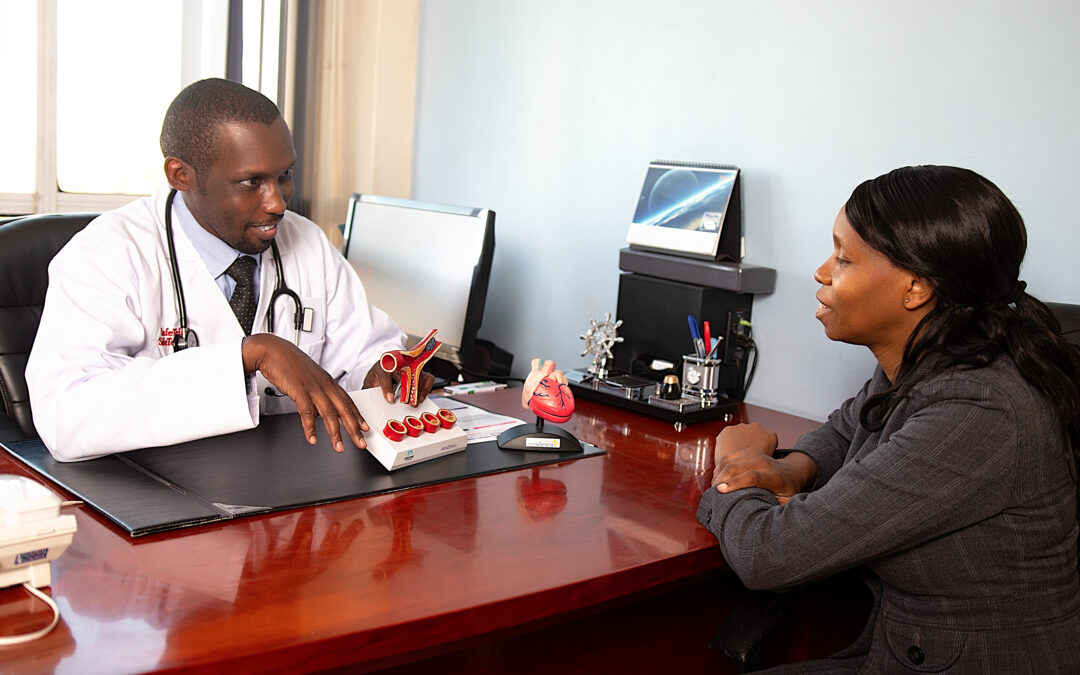It is normal to feel scared and overwhelmed when visiting a cardiologist for the first time, especially when it comes to something as important as your heart. That is why the better prepared you are for a visit, the better the visit can be. It will also allow you to take full advantage of your doctor’s visit.
To schedule a visit with a cardiologist, your Primary Care Physician must first refer you. If your PCP detects symptoms that could indicate cardiovascular disease, they will then recommend you to a cardiologist. If this is the case for you, DO NOT put this off. Your heart depends on it.
For any first-time physician visit, you should always plan for early arrival. An early arrival allows you the extra time you may need to fill out paperwork or answer questions the office may have concerning your insurance. Once the front desk has all the information they need, you are then added to their system as a patient.
Once you are added in as a patient, it is time to meet with the nurse. They will go through their process to gather more information. This is crucial to helping the cardiologist determine what risk factors you may have for developing heart disease and what tests may be needed to confirm a diagnosis.
Nurse’s Responsibilities:
- Takes your vitals and weight.
- Inquires about the reason for the visit.
- Will ask a series of questions concerning personal and family medical history.
- Makes a note of the current medication you are taking, if any.
After the nurse has finished recording all your information and medical history, it is time for you to meet the cardiologist.

What You Can Expect on Your First Cardiologist Visit
- A physical exam will be performed
- More personal and family medical history is discussed
- Possible blood test (unless the doctor prefers to outsource the test)
- Additional tests may be ordered
Depending on the reason for your visit, more tests could be recommended by the doctor. If this ends up being the case, here is a list of what tests the cardiologist might order:
- Blood tests (if not already done in the office) are taken to rule out causes of heart symptoms and measure various levels within the body that may affect the heart.
- Urinalysis tests can help diagnose a variety of conditions, including cardiovascular disease.
- A coronary angiogram is an X-ray used to examine the heart’s coronary arteries as it supplies blood to the heart muscles.
- CT, PET, or MRI scans are used to detect specific types of blood flow to the heart.
- A stress test is performed on a treadmill or bicycle to monitor the heart’s activity as it works harder.
- An echocardiogram is an ultrasound of the inside of your heart where a probe is placed on your chest, belly, and neck to gather images of the heart from every angle.
When your cardiologist appointment is over, be sure that you clearly understand any instructions you have been given. It is important to know what you need to do once you have left the office. If you were given additional labs and tests to take, do not procrastinate. The cardiologist would not have ordered extra tests if they did not think it was vital to your assessment. If the cardiologist requests a follow-up appointment, schedule this before leaving the office. If you wait, it may take longer for them to pencil you in since most cardiologists are booked up months in advance.
Heart disease is the leading cause of death in Kenya for men and women. About 610,000 people die annually in Kenya. from heart disease. More often than not, it is a silent killer. It can occur without any symptoms until a health problem appears, such as a stroke or a heart attack. Therefore, if a problem is detected, you must take steps to treat it early on. This will drastically increase your chances of living a longer, healthier life.

Risk factors to be aware of for heart disease:
- High cholesterol
- High blood pressure
- Overweight or obesity
- Lack of normal physical activity
- Diabetes
- High-stress levels
- Smoking
If you do or do not know why you see a cardiologist, it would be wise to bring a list of your questions. Make sure to write down anything that you are unclear about so that you do not forget. You could also make a list of all the symptoms you have been experiencing.
Doing this would be an aid in having a more productive visit. Take the time to develop a good patient-doctor relationship because your doctor is there to help you get the help you need.
CONTACT US
Heart Care Clinic Of Kiambu
For all appointments and inquiries, please call Here or click here to request an appointment online. We are happy to hear from you.





